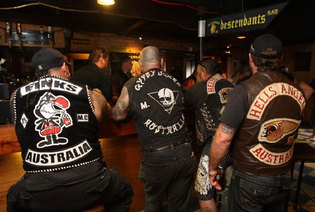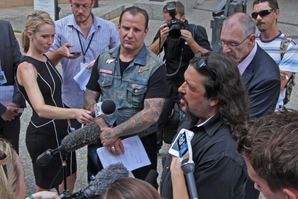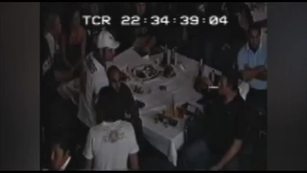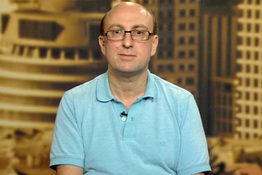 In the Queensland government's sights
In the Queensland government's sights The Milperra Massacre may have been the beginning. I don’t actually know but it’s as good a place as any to start. On September 2, 1984, members of the Bandidos and Comancheros sought a decisive end to an increasingly vicious dispute. The showdown at a British motorcycle swap meet was the culmination of on-going ill-will between the two groups, and the car park outside the Viking Tavern erupted as the patched men clashed head on. The battle was not over quickly, nor was it centralised and pockets of fierce fighting broke out in different places. Knives, baseball bats, chains. Guns filled the air with noise, smoke and bullets. When both sides called time, seven people were dead. The bikies had left an indelible scar on Australian history. Laws around firearms changed in the aftermath of Milperra, but over the years the legislative thrust targeting the bikies increased, notably in South Australia, New South Wales, and now Queensland.
The Queensland measures have gone further than all before them. In fact, 30 years since the Milperra massacre it is the legislation and not the bikies raising the most concern. Numerous people have come to the defence of the outlaw clubs, not least of whom is Tony Fitzgerald QC who headed the Fitzgerald inquiry into political corruption around Queensland Premier Joh Bjelke-Petersen in the late 1980s. About the bikie laws he has been vociferous in his opposition: “History teaches us that claims that repressive laws will reduce serious crime are usually hollow and that laws which erode individual freedom and expand a state's power over its citizens are fraught with peril.”
Peril Indeed, the laws in a nutshell
Under the laws, patched clubs can be declared illegal by political decree, and they have no right to defend themselves. It just happens. If they go to their clubhouse or meet in groups of three or more they will be arrested, bail is forbidden, and those caught will serve a mandatory term of 6 months in prison. If a member wears any regalia denoting membership in a pub the same regime applies.
Furthermore, if a club member commits certain crimes, and there are armfuls of them, he gets the punishment imposed by that crime plus an additional 15 years or, if he is an office holder in the club, an additional 25 years in prison.
If, for example, a person commits a relatively minor crime and is sentenced to two years in prison, if he was a club member he would instead serve either 17 or 27 years. Swap the term ‘club member’ for any other group or association in society and the theoretical underpinnings of this legislation become sinister, and hence some of the concern.
But here’s the kicker, it is not just club members at risk. In December 2013, a woman and her partner, a member of the Life and Death Motorcycle Club, were having a drink with another member in a pub in Dayboro. All three, including the woman, were locked up. A librarian who had been awarded the Lord Mayor’s Award for her actions during the 2011 Brisbane flood disaster, she had never before been in trouble with the law but nevertheless found herself in prison for having a drink with her partner and a friend. It is only one of numerous egregious examples of these laws at work. Research shows that 60 percent of those arrested under the laws are non-club members, and that 42 percent of all charges were minor in nature, including drug and utensil possession, breach of bail, and unlicensed driving. In one instance a group of five men were arrested while buying ice creams.
Of concern to many is the fact that the definitions of an illegal organisation make no mention of motorcycle clubs or patch wearing clubs or any such thing. There is no guarantee it won’t be used against other groups that become seen to be troublesome, particularly protest groups.
In the winter cold of Christchurch I looked across the Tasman and wondered if all of this could actually be true. I set off on a trip around Australia to look at the country’s laws and to meet those affected by them. I started in South Australia before hitting New South Wales and then making my way to Queensland.
The trial begins
And so there I was, at the Federal Courthouse in Brisbane courtroom number one, for the latest test of gang legislation. In the balance are two paths. One is a return to sanity. The other will mean that similar laws spread with the relentless drive of an Aussie bush fire and invariably jump the ditch to New Zealand and perhaps beyond. Great minds think alike, so they say. And so do defective ones.
 Outside the Federal Court
Outside the Federal Court In front of them are the lawyers. Acres of them. The plaintiff, Stefan Kuczborski, is a member of Hells Angels. A man with only a minor drug possession conviction, he is being used to test the law. The legal bill for the clubs alone is around a million dollars. All of the clubs are chipping in and they have raffled motorcycles. There are three lawyers including the tall and tattooed Wayne Baffsky who has been on the Hells Angels side on numerous scraps and is yet to lose one, and Ken Fleming QC who is leading the team.
They are dwarfed by the defence team, made up of the Solicitor General of Queensland, the Solicitor General of the Commonwealth, and the Solicitors General of five other states who have shown up in solidarity. With their hangers-on I count 15 of them.
This is how the armies line up, and Fleming fires the first shots. With his face plastered brown by Brisbane’s sun, and with a dignified manner he tears and pulls at the legislation as an old woman might untangle mistakes in her knitting. Piece by piece until it unravels at his feet.
Of the seven judges one stands out. Judge Hayne. At times he looks bored and disinterested. Tell me something I don’t know, his disposition seems to say. And it appears he knows a lot. He quotes the laws down to the sub section as well as precedents from memory. When he talks he does so purposely, and in a way that is intelligent and imposing. His questions are like demands. It is a manner that could only have been caned into him by a private school education and impeccable learning.
“What is the proposition that underpins the “cannot”,’ he asks at one point.
At the heart of the plaintiffs argument is the legal precedent set down by Kable, a celebrated case that has been used in court cases involving motorcycle clubs before. If you want to know more about that, I’m not your man. In a nutshell, though, the primary argument is equality before the law. If two people commit the same offense, why should they be treated differently just because they belong to a motorcycle club? As Fleming puts it, “Relevant cases should be treated as identical”
The Solicitor-General of Queensland, Peter Dunning, is the first to rise in the defence of the laws. Younger than Flemming, his thick-rimmed glasses make him look more academic than legal, although even I’m not sure what I mean by that. His was a remarkable oratory effort. Here was a man who spoke for over an hour without so much as the slightest flicker of charisma. The substance of his argument was around the freedom of the legislature to make laws it sees fit and that the check and balance is the voting public.
“There undoubtedly would be those who not only would say; have said, that they think such laws are unhelpful or ineffective”, Dunning said. He then concluded that “this is ultimately a political inquiry”.
In other words, the politicians would prefer that the judiciary mind its own business.
At a certain point Dunning was asked by Judge Bell what would happen if the Plaintiff and two other members of his club were in the courtroom. After prevaricating for a while, Dunning conceded that all three would be arrested and charged – meaning no bail and a mandatory six month sentence. At that point I’m pretty sure a single eyebrow on each of the judges raised in collective surprise. Only Judge Hayne looked unmoved.
The rest of the defence lawyers who gave oral submissions identified small points to attack, it was well coordinated but unremarkable, except for the Solicitor General for Western Australia Grant Donaldson, who, after being asked questions he couldn’t answer, sat down, suggesting he would take the “coward’s way out” and allow the Solicitor General for Queensland to address them. They were never answered.
The mistaken premise
So after a day and a bit in court, still in dirty jeans and now drinking beer in the hotel bar I’m reading through copious notes, trying to make sense of all of this and two things are clear to me, the first is I’m a bit homesick and the second is all of these arguments are almost beside the point. That’s not to say that they’re not important. Obviously they are, the whole case rests on them, but the crux of this issue actually rests not on legal arguments but on a fundamental misunderstanding. And that annoys me as much as it does anybody, because I’d like to go to bed.
If you look at the arguments around the justification for legislation you can clearly see references to organised crime. One of the judges made an analogy about the mafia. The defence lawyers often mentioned organised criminal groups. Organised crime, organised, crime, organised crime.
But here’s the trick. The bikie clubs are not organised crime groups. It is a basic matter of fact that these clubs formed for reasons other than crime – it was bikes, brotherhood, birds and booze. Even the cops acknowledge there was nothing more than that. Over the years the picture has become murkier. Now, certainly, club members are more likely to be criminally inclined in profit-driven crime than the average Joe, but such crime is the work of individuals within groups not the groups as a collective. The original creed of the clubs still stands. Many people will be sceptical of this claim, but it is undeniably true. The reasons for this are based on greed (individual crooks don’t want to share their profits with the whole); laziness or prudence (some members can’t be bothered or are disinclined to enter the fray); and a desire for organisational survival: the groups know that if they commit crimes collectively then one police bug or rotten informant could bring the whole group down in one fell swoop. If it does happen, it is the exception rather than the rule. If it does happen, there has hardly been a skerrick of evidence to support it. It doesn’t happen.
And this is why the Queensland legislation works by political decree; they wouldn’t get it on facts.
This is important. If the crimes are committed by members rather than the group itself, then getting rid of the group won’t stop the crime: it will simply be undertaken by the same individuals who no longer belong to the group. Therefore, nothing changes, meaning nothing is gained.
Notwithstanding that there have been some cracking bikie brawls in recent times that have only occurred because such clubs exist. The ‘Ballroom Blitz’ in 2006, a violent brawl between the Finks and the Hells Angels which was particularly vicious and caught on camera, captured the public’s imagination. And the incident of the Bandidos fracas on the Gold Coast in 2013, as over-hyped as it was, was enough to spark the latest legislative effort in Queensland.
 Moments before the Blitz
Moments before the Blitz I have met a lot of bikies on my trip to Australia. I drank my way through three states. Here, as is the case at home, there are rascals among them, of course. A minority are hard core criminal. Most are just people. I’d love to tell you different, to hype this story, to give you salacious details, but I’d be making it up. Some people may believe that I’ve been hoodwinked. I’ll bet you anything you like those people will never have met one. Ignorance rules the roost when it comes to this subject.
Still, why take my word for it when Dr Terry Goldworthy of Bond University, a former high-ranking cop, has compiled some statistics. They show that during the period the legislation has been in place, police have seized $200,000 worth of drugs. When that is divided by the number of people arrested it shows that each person could have earned around $260 per month, an amount that he says is “hardly the stuff high rollers are made of”. Furthermore, the violence that heralded the laws is all but non-existent in the data, with club members – including associates – making up just 0.06 percent of reported assaults during the period under study. What’s more, and perhaps most surprisingly, the majority of club members in Queensland have no criminal convictions at all.
So why all the fuss? Two reasons, I would argue: the first is that the clubs are obvious and thus an easy target, and the second is that they deliver the politicians their drugs of choice: votes.
The real rationale
Bikies in Australia, and gangs of all hues in New Zealand, have become political tools with which politicians can gain electoral advantage. Ramp up the gang issues, seem tough on law and order and get public support. It is a winning formula.
In New Zealand we can actually see its genesis. Before the 1972 election Norman Kirk promised to ‘take the bikes off the bikies’. He won the election. Game on. Australia has had similar experiences: Mike Rann in South Australia, Nathan Rees in NSW and now Campbell Newman in Queensland, the mastermind of this latest folly who has moved with a force greater than all of those who have proceeded him. Clearly he has learned nothing from the others who had their laws struck down by the courts. I don’t know the politics of Queensland. It may well be that Newman is a brilliant thinker and honest man in all other areas, but in this case at least he’s definitely not one of these and probably not both.
Newman has used the old recipe of create a big problem, provide an answer, and gain public support. It is as obvious as it is unimaginative. But it continues to work, insomuch as it garners electoral advantage. This is not a great comment on democracy. Yet the judiciary are not politicians. Their job is done with a sober rationality and an eye on justice.
The concerns of the plaintiff’s lawyers are that the judiciary is very conservative. Be that as it may, this legislation will fall over, not least because it encroaches on judicial freedoms – no judges, however conservative, like that. Furthermore, I back logic over rhetoric. I think intelligence trumps ignorance. I believe the bikies will defeat Newman. And that will be a just and right result.
The cost will be to the people already caught up in these draconian measures, the families who have suffered. Many of you will have little sympathy here; few will care for the bikies and those who surround them. So perhaps people will focus on the cost to the taxpayer whose money has been burnt by political folly on measures that tampered with fundamental rights of citizens for no real gain.
As I look back on what I have written now, and at all of my notes, which are long and often illegible I realised that I’d come to Australia to find out something strange, frightening and new. These laws promised all of that but in the end I found that underpinning them all was just the same old story.
We have more to fear from idiot politicians than we do from most crooks.





 RSS Feed
RSS Feed